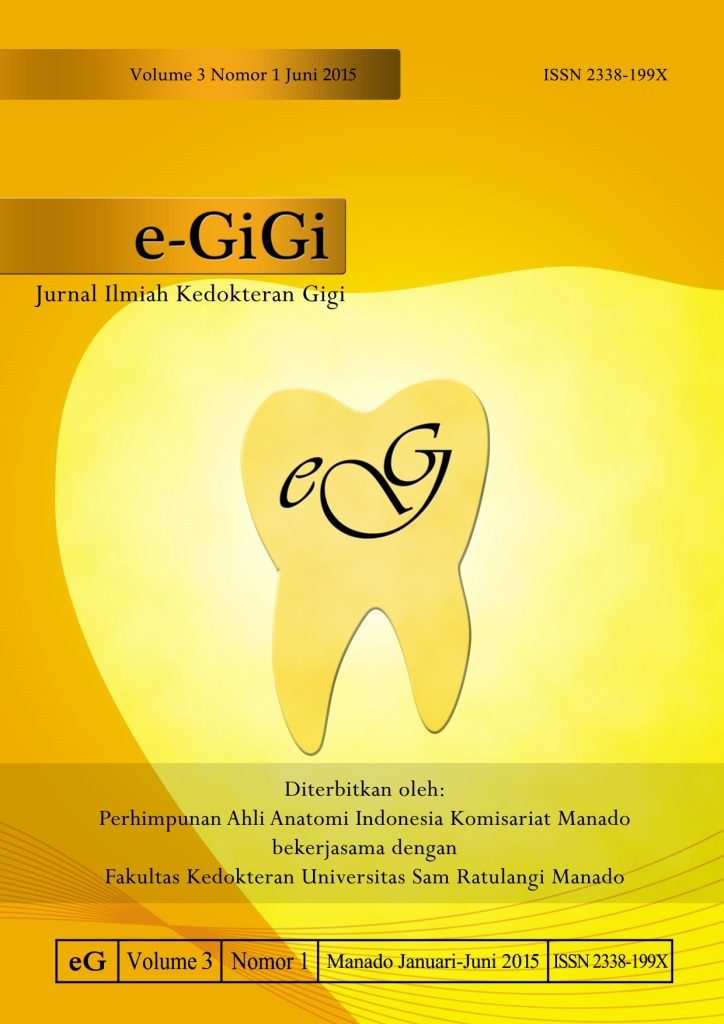GAMBARAN KEBUTUHAN PERAWATAN PERIODONTAL PADA PEROKOK DI DESA MATUNGKAS KECAMATAN DIMEMBE
DOI:
https://doi.org/10.35790/eg.3.1.2015.6454Abstract
Abstract: Periodontal disease is the most common oral disease in Indonesia, especially in rural areas. One of the habits that can aggravate the status of oral hygiene which result periodontal disease is smoking. In addition, the prevalence of smokers in North Sulawesi is quite high when compared to other provinces. This research was conducted in Matungkas Village because high levels of smoking habits. Theres no limit of gender and age for people to smoke, men or women, and teens to the elderly. The purpose of this study was to describe the periodontal treatment needs of the smokers in Matungkas Village District of Dimembe. This type of research is a descriptive research with cross sectional study. The number of samples were taken using the Slovin formula and proportional simple random sampling method. The number of samples are 89 people from 11 parts of the village. Community Periodontal Index Treatment Needs (CPITN) assessment scores was used in this study. The results of this study indicate that the most treatment needs of smokers in the Matungkas Village District of Dimembe seen from the number of cigarettes and frequency of smoking habit is type II services with treatment needs of improvement OHIS and scaling. According to the result, it is suggested that the people of Matungkas village should reduce their smoking habit as a causing factor of periodontal disease and do the routine check up to the dentist every 6 months for the periodontal treatment needed..
Keywords: periodontal treatment needs, smokers
Abstrak: Penyakit periodontal merupakan penyakit gigi dan mulut yang paling banyak diderita masyarakat Indonesia, khususnya di daerah pedesaan. Salah satu kebiasaan yang dapat memperburuk status kebersihan mulut dan mengakibatkan terjadinya penyakit periodontal yaitu merokok. Selain itu, prevalensi perokok di Sulawesi Utara cukup tinggi jika dibandingkan dengan provinsi lain. Penelitian ini dilakukan di Desa Matungkas karena tingkat kebiasaan merokok yang tinggi. Jenis kelamin dan usia tidak membatasi masyarakat untuk merokok, laki-laki maupun perempuan, serta usia remaja sampai lanjut usia. Tujuan penelitian ini ialah untuk mengetahui gambaran kebutuhan perawatan periodontal pada perokok di Desa Matungkas Kecamatan Dimembe. Jenis penelitian ini merupakan penelitian deskriptif dengan pendekatan cross sectional study. Besar sampel diambil menggunakan rumus Slovin dan metode proportional simple random sampling. Jumlah sampel yang diambil sebanyak 89 orang dari 11 dusun. Penelitian ini menggunakan skor penilaian Community Periodontal Index Treatment Needs (CPITN). Hasil penelitian ini menunjukkan bahwa gambaran kebutuhan perawatan pada perokok di Desa Matungkas Kecamatan Dimembe dilihat dari jumlah rokok dan lama merokok yang paling banyak ditemukan ialah tipe pelayanan II dengan kebutuhan perawatan perbaikan OHIS disertai skeling. Berdasarkan hasil tersebut, masyarakat perlu mengurangi kebiasaan merokok yang merupakan salah satu faktor penyebab penyakit periodontal dan melakukan pemeriksaan rutin ke dokter gigi setiap 6 bulan sekali untuk mendapatkan perawatan periodontal yang dibutuhkan..
Kata kunci: kebutuhan perawatan periodontal, perokok
Downloads
Published
How to Cite
Issue
Section
License
COPYRIGHT
Authors who publish with this journal agree to the following terms:
Authors hold their copyright and grant this journal the privilege of first publication, with the work simultaneously licensed under a Creative Commons Attribution License that permits others to impart the work with an acknowledgment of the work's origin and initial publication by this journal.
Authors can enter into separate or additional contractual arrangements for the non-exclusive distribution of the journal's published version of the work (for example, post it to an institutional repository or publish it in a book), with an acknowledgment of its underlying publication in this journal.
Authors are permitted and encouraged to post their work online (for example, in institutional repositories or on their website) as it can lead to productive exchanges, as well as earlier and greater citation of the published work (See The Effect of Open Access).






